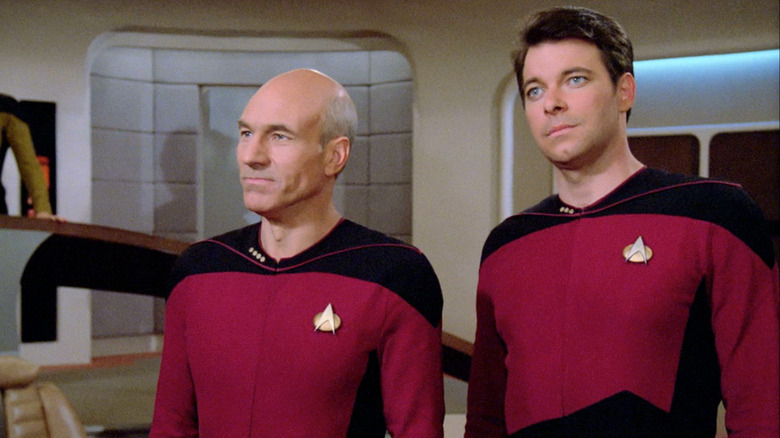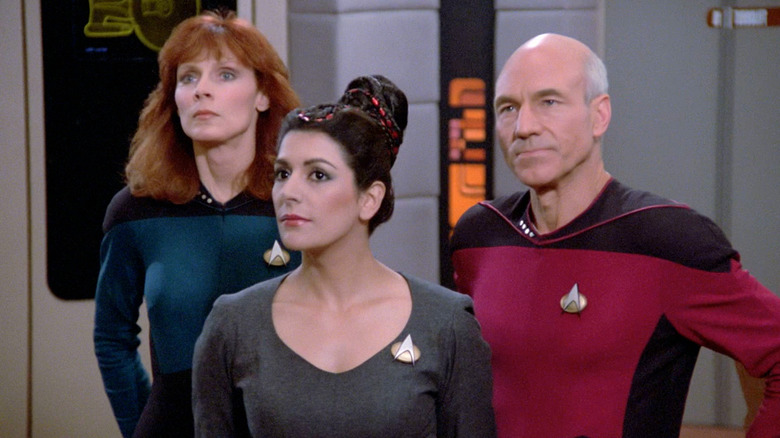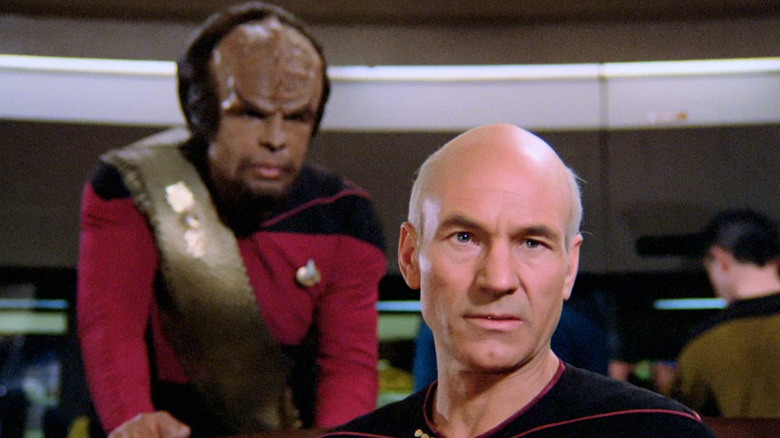A Lonely Patrick Stewart Relied On His Star Trek Crew To Keep Him Sane
Back in 1986, Patrick Stewart famously balked at playing the role of Jean-Luc Picard on "Star Trek: The Next Generation." The role was contracted for six seasons, and the actor had never made that enormous of a commitment before. Many of Stewart's professional colleagues encouraged him to sign the contract, feeling that it was to be lucrative, and that "Star Trek: The Next Generation" would be swiftly canceled and he could walk away and work on other projects. Only his friend Ian McKellan discouraged Stewart from moving to TV, feeling that they both had more important things to be done on stage.
But Stewart signed the contract, went to Los Angeles, and crashed with a friend for a few weeks at a posh mansion in Bel Air. Strewart's rich friends provided him with good food, access to a swimming pool, and fascinating conversation. In exchange, Stewart only needed to bring home interesting stories from the set of the then-nascent "Star Trek: The Next Generation." Stewart recalls that the stories were many.
The actor recounts all of these experiences in his new autobiography "Making It So: A Memoir." He also recalls feeling like something of an outsider among his fellow Trek cast members. Stewart, recall, is a classically trained star of the British stage, while the "Next Generation" cast was made up of a few established stars, a few workaday veterans of the business, and a few semi-neophyte upstarts happy to be getting their highest-profile gig as their big break. There was only one other British member of the cast, and Stewart said, in the very early days, he was grateful to have something in common with Marina Sirtis, the actress who played Counselor Deanna Troi.
Tottenham Hotspur
"What a crew we were," Stewart wrote. "Star Trek: The Next Generation" only had two notable stars in its debut, and they were the youngest actors on set. Wil Wheaton, who played Wesley Crusher, had already starred in feature films like "Stand By Me" and "The Gate," while the 30-year-old LeVar Burton was already recognized for his work on "Roots" and "Reading Rainbow." Stewart remembered Gates McFadden as an experienced choreographer and dancer, Michael Dorn as an intimidating character actor from an episode of "CHiPs," Jonathan Frakes as an actor "who bounced from one TV show to another," and Brent Spiner as having "a background in New York theater and sitcoms." Denise Crosby he saw as a star of soap operas.
Marina Sirtis, meanwhile, was also from England, and also moved to Los Angeles for the first time, giving Stewart an unexpected compatriot. "In the early days especially," he wrote "I clung to Marina like a life raft because I so desperately needed someone with whom I shared some cultural points of reference." It was a relief, it seems, to have someone in the room who knew details of English football, and who also understood the fineries of the English theater scene. Stewart wrote:
"[Marina] is from North London rather than the North of England, but we had in common our working-class and drama-school backgrounds and our passion for soccer. Marina was, and is, a passionate supporter of Tottenham Hotspur, a football club currently of an entirely different rank than my club, Huddersfield Town. But Huddersfield has a hundred-year history as distinguished as any club in the English Football League, and it brought me so much relief that there was someone on the bridge of the Enterprise who had even heard of Huddersfield Town."
Doubtless, a relief.
Cucumber soup
Tottenham Hotspur, for the record, has won far more league and cup victories than Huddersfield Town.
Stewart recalled the grim levels of comfort on the Paramount lot, describing his trailer as little more than "a small, boxlike cabin" with a sleeping platform in it "of the type you might find in a prison cell." The trailers had no private bathrooms either, and actors would have to use the studio's public restroom stalls during the day. Stewart, and all the other actors, largely stayed in their trailers most of the day, only serving to underline their isolation.
Very slowly, however, that isolation gave way to camaraderie. It wasn't until Stewart was overheard talking to a reporter that he received a small word of admiration from a co-star. As he wrote:
"Little by little, this motley group of strangers of wildly disparate résumés began to coalesce into an ensemble, and I didn't feel so alone. At some point during the shooting of the pilot episode, I was taken aside for some media interviews. As I sat on a soundstage speaking to a journalist, I was unaware that LeVar was nearby, listening to the whole thing. When it was over, he appeared in front of me and said simply, 'Cucumber soup.' 'I'm sorry?' I said. 'Cucumber soup. You are as cool as cucumber f***ing soup.'"
Stewart said that this was the best compliment he could ever receive, as he considered LeVar Burton to be one of the coolest people he had met. Eventually, the relaxed attitudes of his co-stars helped him become used to the rigors of working in television and to lighten up. "Because Lord knows," he said, "I needed to lighten up."


